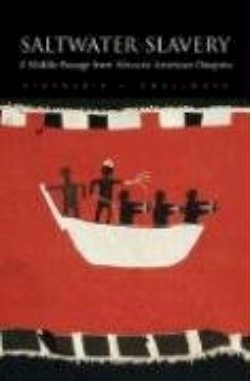Saltwater Slavery
A Middle Passage from Africa to American Diaspora
With this new study of transatlantic slavery, Smallwood promises to add an unprecedented dimension to research on American slavery. Educated at Columbia and Duke, Smallwood has received grants to do research in the United Kingdom and Ghana from the Faculty Career Development Program, Center for Humanities, and the Faculty Senate Committee on Research at the University of California in San Diego. She also earned postdoctoral fellowships from Princeton University’s Shelby Cullom Davis Center, a center committed to excellent historical scholarship, and a Chancellor’s Postdoctoral Fellowship from the University of California, Berkeley. The author has worked as an assistant professor, teaching in both the history and critical gender studies departments at the University of California in San Diego.
Focusing on the thoughts, feelings, and experiences of those adversely affected by slavery, Smallwood begins by examining the slave trade in Africa, including the bartering of men won during wars with other Africans. Her description, which includes quotes from other sources, of the conditions under which the captives were kept reveals shocking information. For example, irons and shackles for the captives were a “luxury,” and there were “lapses in security” at the prisons. Of course, captives took advantage of such opportunities to escape. After taking the reader out of the Gold Coast and into the Atlantic, the author turns her attention to African uprisings and other situations, for example death and starvation, that interfered with turning human beings into human commodities. Describing the rationale of the entrepreneurs who looked to slavery to turn profits, the author writes, “Buying people who had no evident social value was not a violation or an act of questionable morality but rather a keen and appropriate response to opportunity; for this was precisely what one was supposed to do in the market: create value by exchange, recycle someone else’s castoffs into objects of worth.” One of Smallwood’s most thought-provoking chapters focuses on “life after the slave ship” and features a narrative told by an African slave; thus, satisfying her thesis: tracing the stories of slaves from Africa to America.
Perhaps the fresh perspective the author lends the study of slavery lies in her title. Because American born slaves saw themselves as distinct from Africans newly arriving in America, they dubbed the newcomers “Saltwater Negroes.” “Through their own terminology, the descendants of saltwater slaves articulated their awareness of the problem of enforced migration. In speaking of ‘saltwater’ origins, they [the descendants of saltwater slaves] gave a name to the interchange between the slave ship and the slave community, between the new African migrants…and the American-born children [of slaves].” Looking critically at saltwater slavery, means looking closely at the numerous aspects of migration from Africa to America.
Reviewed by
Kaavonia Hinton
Disclosure: This article is not an endorsement, but a review. The publisher of this book provided free copies of the book to have their book reviewed by a professional reviewer. No fee was paid by the publisher for this review. Foreword Reviews only recommends books that we love. Foreword Magazine, Inc. is disclosing this in accordance with the Federal Trade Commission’s 16 CFR, Part 255.

